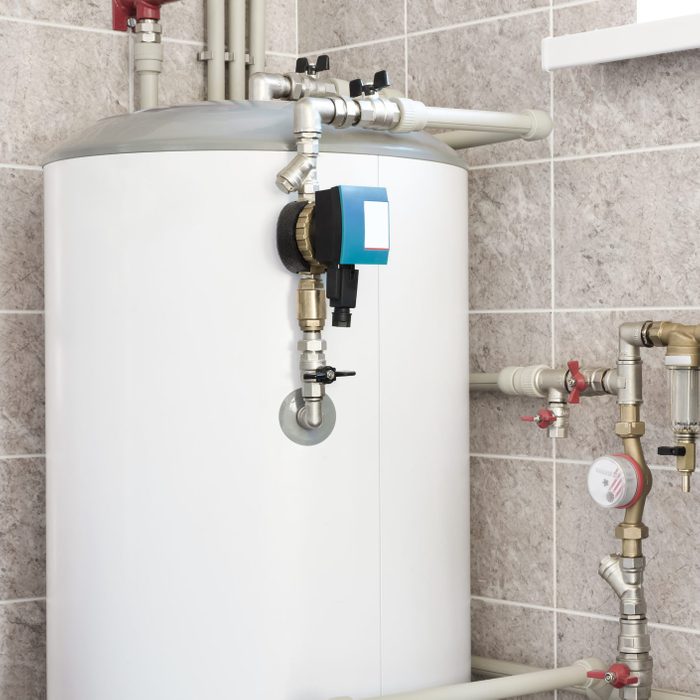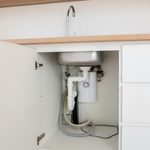How Long Do Water Heaters Last?

Water heaters don't last as long as most people think. Learn the telltale signs that you're due for a new one.
The water we use for bathing and showering is corrosive, and nothing demonstrates that better than your water heater. Oxygen rusts metal, and water is loaded with oxygen. This is one reason why water heaters don’t last forever.
Here’s another: sediment buildup. Most residential water, even from a municipal treatment plant, contains minerals like calcium and iron. When these minerals settle and collect on the bottom of the tank, there’s less room for water, which also takes longer to heat. In electric water heaters, these minerals collect on the elements and reduce their heating efficiency.
Sediment and corrosion problems develop slowly. It may take years for water heater performance to suffer, but sometimes catastrophes happen.
I recently got a call from a friend whose old water heater started leaking from the bottom. I explained she needed a new one, so she had to go without hot water until she could book a plumber. She could have avoided the hassle had she realized the unit exceeded its life expectancy and should have been replaced earlier.
On This Page
How Long Should Water Heaters Last?
According to the pros, a tank-style water heater should last from six to 13 years. Six years would be a notably short lifespan. Most of the time, a water heater should still perform at a high level for well over a decade. Our propane water heater, already in place when we bought the house 15 years ago, is still going strong and was recently pronounced in good condition by the plumber who flushed it.
An on-demand water heater doesn’t store water, and for that reason alone can last 20 years or longer. Clogging from mineral deposits can occur, but those can be dissolved with a good vinegar cleanout.
Water Heater Warranties
Manufacturer warranty periods for tank-style water heaters range from six to 12 years. For an additional fee, some manufacturers offer extended warranties for another one to three years.
Tankless water heater warranties, which typically cover the heat exchanger, can last from 10 to 25 years. Homeowners also can purchase coverage as part of a home warranty package.
To determine the age of your water heater, look for the serial number. The first character is a letter that corresponds to the month of manufacture (“A” for January all the way to “L” for December). The next two characters denote the year of manufacture. So a unit with a serial number beginning D09 was manufactured in April 2009.
Some installers place a sticker on the heater indicating the length of the warranty and when it expires.
Signs of Water Heater Failure
Water heaters often signal they’re on track to fail long before they do. Here are some things to look for:
- Strange noises: Popping, crackling or rumbling sounds indicate a thick layer of sediment in the bottom. Sometimes you can flush out the sediment, but sometimes you can’t.
- Discolored water: Yellowish or brownish hot water indicates a rusty tank.
- Low water pressure: Hard water deposits or corrosion in the hot water outlet blocks water flow and reduces pressure. If you have a tankless model, this can even prevent the unit from switching on.
- Insufficient hot water: If you frequently run out of hot water while showering or washing clothes, it’s a sign of poor water heater performance. You may notice an uptick in your energy bills.
- Visible leaks: If you see water on the floor or in the drain pan, it’s time to call a plumber. The water heater could be one frayed seam away from causing an all-out flood.
How To Make Water Heaters Last Longer
Two maintenance tasks homeowners commonly fail to do can lengthen the life of a water heater:
Flush the tank
Turn off the heater and the water supply, let it cool, then drain about half the water. Disconnect the water inlet pipe or remove the anode rod and pour in one or two gallons of vinegar. After several hours, drain the tank completely. Then reconnect the water supply, refill the tank and turn the heater back on. Experts recommend doing this once a year.
You can also flush a tankless model. Close the isolation valves on the unit and circulate a vinegar solution through the coils with a pump.
Replace the anode rod
Every tank-style heater has an anode rod, which attracts the ions that corrode the tank lining. In doing so, the rod itself corrodes and disintegrates. Manufacturers recommend replacing it every three to five years, or when it has deteriorated by 50 percent.
To replace the rod, turn off the water and the heater, let the water cool, then unscrew the rod and lift it out from the top of the tank. Install the new one, tighten it down, then turn everything back on.
What To Do If Your Water Heater Fails
If your water heater stops working or springs a major leak, you have to replace it. That’s usually a job for a plumber. It may be several days before the plumber comes, so it’s important to turn off the power and water.
- Flip off the circuit breaker if you have an electric model. If it’s a gas model, turn the dial on the front of the unit to OFF and turn off the gas supply valve.
- Locate the shut-off valve for the cold water supply (it’s often blue) and turn it off.
- Locate the shut-off valve for the hot water (it’s usually red) and turn it off.
- Leave everything off until the plumber arrives.



